Spotlight PA is an independent, nonpartisan newsroom powered by The Philadelphia Inquirer in partnership with PennLive/The Patriot-News, TribLIVE/Pittsburgh Tribune-Review, and WITF Public Media. Sign up for our free newsletters.
HARRISBURG — Democratic Gov. Tom Wolf’s administration completed its internal investigation into a multimillion-dollar unemployment mistake in mid-2017, but failed to make the findings public until this week, according to newly released documents.
In response to questions by Spotlight PA, the Office of Inspector General late Tuesday released a one-page summary of its inquiry into a state error that resulted in thousands of unemployed Pennsylvanians being overcharged millions in interest payments over a decade.
The summary states that the inspector general launched its investigation in May 2017 after receiving a complaint from an unnamed state employee about the Department of Labor and Industry, which oversees the state’s massive unemployment compensation system. The employee told investigators that the agency was using an inflated interest rate when collecting money from people who, for various reasons, had been overcompensated in unemployment benefits.
The investigation was completed three months later, in mid-August 2017, finding among other things that the mistake was the result of “human error” and lack of oversight.
A spokesperson for the inspector general’s office did not respond to a request for comment Tuesday about why the findings were kept under wraps for four years.
The office historically has not made its investigative reports public, instead providing them only to the governor and to top staff at the agency being investigated. But after a change in state law in 2017, the office said it would prioritize making most of its findings public and since then has posted many on its website.
Wolf’s office on Tuesday did not immediately respond to questions about whether it received a copy of the inspector general’s report in 2017.
Earlier in the day, administration officials sidestepped questions about when the investigation had been launched, who ordered it, when it was completed, who reviewed the results, and what, if any, actions were taken once it was done.
When pressed, the governor’s spokesperson, Elizabeth Rementer, said that Wolf only learned about the issue last week.
Wolf, she said, “had discussions with staff over the weekend, and directed L&I to complete the correction process.”
In response to a Spotlight PA investigation, the Department of Labor and Industry last week admitted that, between 2006 and 2016, it had erroneously charged hundreds of thousands of people an inflated interest rate.
In publicly acknowledging the error, less than 24 hours after Spotlight PA asked for formal comment on the mistake, the department said about 250,000 people had been overcharged and it would issue $14 million in refunds.
The agency also said that most people were owed $50 or less in refunds. Former employees who worked on the problem came forward and told Spotlight PA they believe many people were owed far larger refunds.
They also said they were directed to keep the error secret when they were employed at the agency — a claim officials have denied.
According to interviews, internal emails, and other documents reviewed by Spotlight PA, when the state learned about the mistake in late 2016, it referred to it as the “interest rate problem.”
Spotlight PA’s investigation found the agency failed to adjust interest rates set annually by the state Revenue Department, which ranged between 3% and 8%, from 2006 to 2016.
Instead, the agency charged a fixed 9% interest rate.
An initial analysis by a department staffer found that in that time, the state established more than 674,000 overpayment claims, totaling $889 million, according to records reviewed by Spotlight PA.
Of these claims, about 124,000 were considered “at-fault” — representing about $345 million owed by people the state overcompensated because they made a mistake on their paperwork, for example, or their claim was disputed by their employer, or as a result of deliberate fraud.
The rest were considered non-fault overpayments, which were the result of a mistake made by the state and were not charged interest.
Steep penalties follow if a person cannot pay their bill and the high interest rate. The state can place liens on a person’s property, causing credit to be significantly diminished by the debt, or place them in a probation program.
In an email this week, Labor and Industry spokesperson Penny Ickes said addressing the issue “was not a simple or fast process,” because of the problem’s scope and the pandemic.
She said some affected people had already received refunds. But those occurred on a case-by-case basis, usually when agency staff discovered the person was owed money while helping with an unrelated issue.
In the one-page summary released Tuesday, the inspector general’s office said it interviewed nine current and former employees at the Department of Labor and Industry.
“All agreed that the problem existed and resulted from ‘human error’ and lack of oversight,” it states.
WHILE YOU’RE HERE… If you learned something from this story, pay it forward and become a member of Spotlight PA so someone else can in the future at spotlightpa.org/donate. Spotlight PA is funded by foundations and readers like you who are committed to accountability journalism that gets results.
